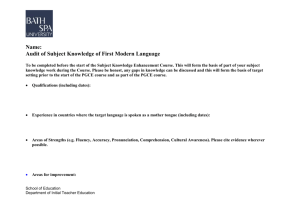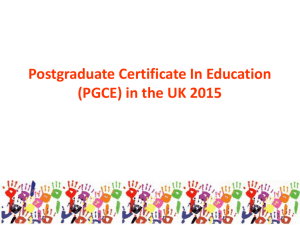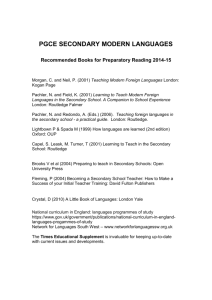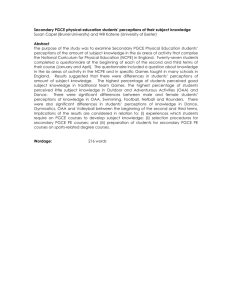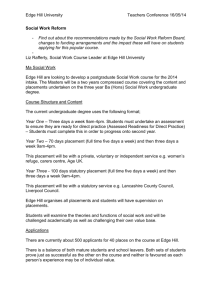MODERN FOREIGN LANGUAGES
advertisement
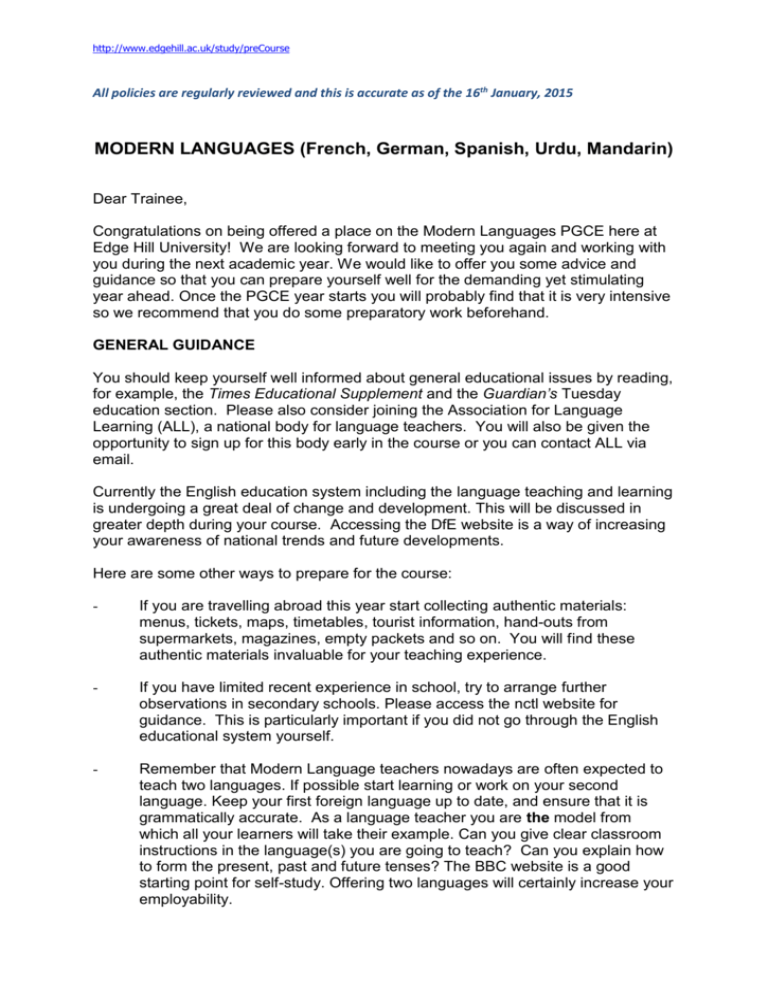
http://www.edgehill.ac.uk/study/preCourse All policies are regularly reviewed and this is accurate as of the 16th January, 2015 MODERN LANGUAGES (French, German, Spanish, Urdu, Mandarin) Dear Trainee, Congratulations on being offered a place on the Modern Languages PGCE here at Edge Hill University! We are looking forward to meeting you again and working with you during the next academic year. We would like to offer you some advice and guidance so that you can prepare yourself well for the demanding yet stimulating year ahead. Once the PGCE year starts you will probably find that it is very intensive so we recommend that you do some preparatory work beforehand. GENERAL GUIDANCE You should keep yourself well informed about general educational issues by reading, for example, the Times Educational Supplement and the Guardian’s Tuesday education section. Please also consider joining the Association for Language Learning (ALL), a national body for language teachers. You will also be given the opportunity to sign up for this body early in the course or you can contact ALL via email. Currently the English education system including the language teaching and learning is undergoing a great deal of change and development. This will be discussed in greater depth during your course. Accessing the DfE website is a way of increasing your awareness of national trends and future developments. Here are some other ways to prepare for the course: - If you are travelling abroad this year start collecting authentic materials: menus, tickets, maps, timetables, tourist information, hand-outs from supermarkets, magazines, empty packets and so on. You will find these authentic materials invaluable for your teaching experience. - If you have limited recent experience in school, try to arrange further observations in secondary schools. Please access the nctl website for guidance. This is particularly important if you did not go through the English educational system yourself. - Remember that Modern Language teachers nowadays are often expected to teach two languages. If possible start learning or work on your second language. Keep your first foreign language up to date, and ensure that it is grammatically accurate. As a language teacher you are the model from which all your learners will take their example. Can you give clear classroom instructions in the language(s) you are going to teach? Can you explain how to form the present, past and future tenses? The BBC website is a good starting point for self-study. Offering two languages will certainly increase your employability. http://www.edgehill.ac.uk/study/preCourse In order to qualify as a teacher you are required to have a range of Information Technology (IT) skills. There will be sessions at Edge Hill devoted both to helping you to consolidate your own skills and to preparing you to use IT in the classroom for language learning. If you are inexperienced in IT we strongly recommend you develop your skills before the course begins. If you’re not sure what to do, see what courses your current university or college offers. Alternatively you could contact your local FE College and see what courses they have on offer. All your assignments must be word-processed. Typical, useful IT skills include: - digital recorders / audacity using the internet using a video camera, digital camera using e-mail video-conferencing using the interactive whiteboard word-processing – including clip art, images, tables, formatting using PowerPoint / prezi using spread sheets (Excel) Our communication during the course will be via email and our VLE. This is especially the case when you are on school placement. It is therefore essential for you to have reliable access to the internet throughout the course. THE COURSE IN BRIEF The Modern/Community Languages course at Edge Hill University consists of four interrelated modules which examine different aspects of modern language teaching and learning. You will be given a detailed reading list once you get to Edge Hill but we expect you to do some pre-course reading. For the first part of the course we will be focussing on how languages are learnt, on the National Curriculum, on how to plan lessons and how to put those plans into practice. In order to prepare for this you may like to buy (and read!) a copy of the following publications: Burton, N., Brundrett, M. and Jones, M. (2014). Doing Your Education Research Project. 2nd ed., London: SAGE Byram, M (ed.) (2004). Routledge Encyclopedia of Language Teaching and Learning. London: Routledge Cajkler, W. and Addelman, R. (2000). The practice of Foreign Language Teaching, 2nd ed., London: David Fulton Pachler, N., Barnes, A. and Field, K. (2009). Learning to Teach Modern Foreign Languages in the Secondary School: A Companion to School Experience. 3rd ed., Oxon: Routledge Ur, P. (1999). A Course in Language Teaching: Practice and Theory, Cambridge: Cambridge University Press http://www.edgehill.ac.uk/study/preCourse During your Curriculum Studies at Edge Hill University you will spend time consolidating your own linguistic skills for teaching purposes and exploring ways of making language learning accessible to your learners. You will be assessed at the beginning of the course and an individualised language programme will be agreed with you. This will include seminars in your language(s). If you do not have a second foreign language we suggest you follow a beginners’ course. At other times you will be in a mixed group of trainee teachers of French, German, Spanish, Mandarin and Urdu, looking at issues of teaching and learning methodology which are common to all languages. You will be required to complete a range of assignments relating to aspects of your course in the first two terms. These will, on the whole, have both a theoretical as well as a practical focus and give you the opportunity to reflect on the nature of your experience in schools. During the year you will spend much of your time in at least three different settings: one primary and two post-11 institutions. Post-16 enhancement will either be covered in one of your placement schools or by attending a post-16 setting during one of your professional practice blocks. You will be given the opportunity both to observe and to teach. The amount of teaching you do will increase as the year progresses. In this way you should find that there is a balance between your opportunities for reflective thought, practical teaching and individualised target-setting to enable you to meet the national professional standards for qualified teacher status. We hope that this pre-course information has given you an insight into the nature of the PGCE Modern Languages course. We also hope that we have given you some ideas about preparing yourself for the PGCE year so that you come to Edge Hill confident in your subject knowledge and feeling enthusiastic about the course. In the meantime, please do not hesitate to contact Edge Hill if you have any queries. We look forward to welcoming you! Best wishes Monika, Helen and the course team Monika Reece PGCE Secondary MFL Course Leader (Full-time Route) Tel: 01695 650 962 Email: reecem@edgehill.ac.uk Helen Thomas PGCE Secondary MFL Course Leader (Flexible Route) Tel: 01695 650 829 Email: Helen.Thomas@edgehill.ac.uk
